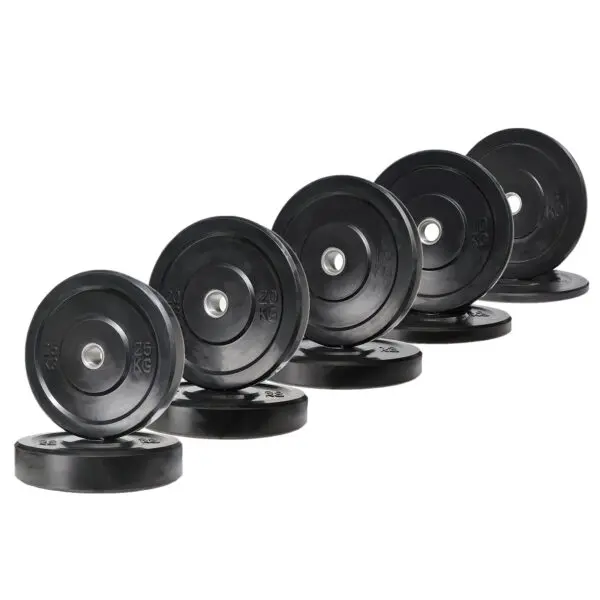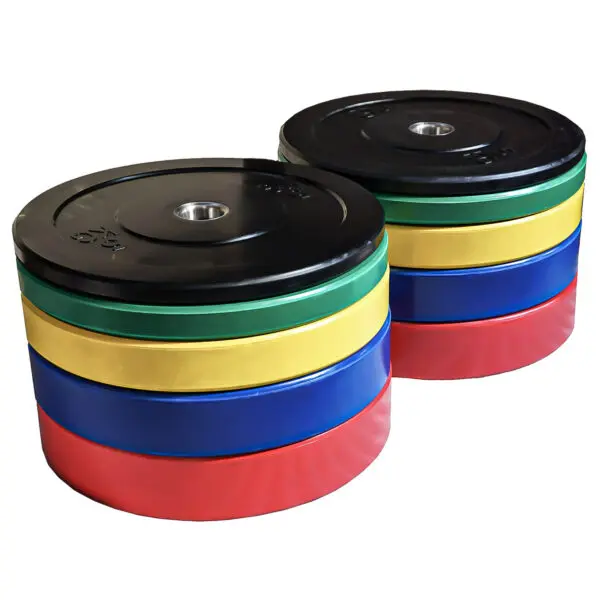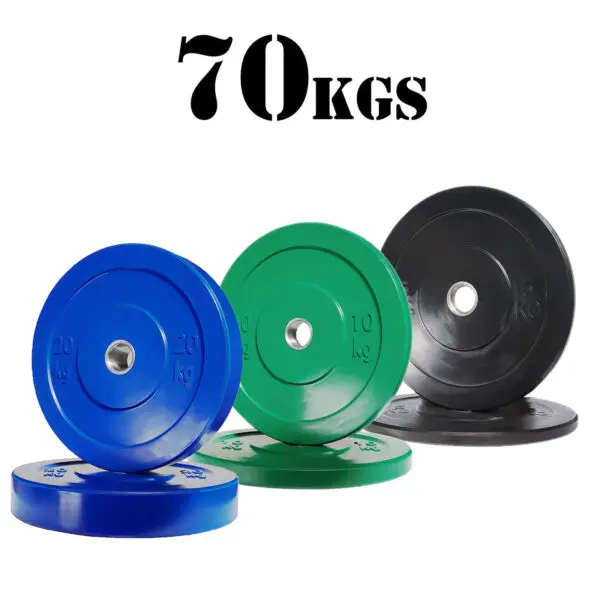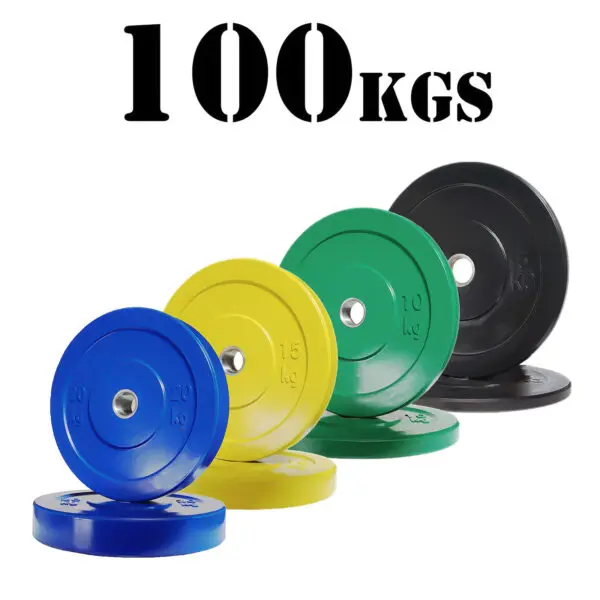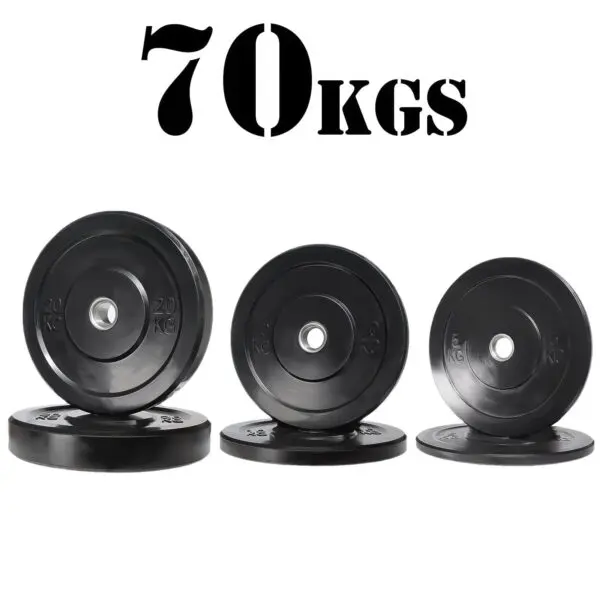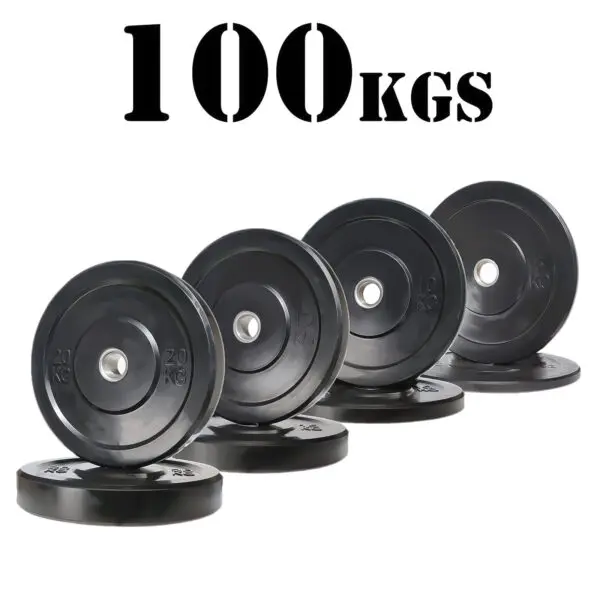Performing the Olympic lifts – snatches and clean and jerks will invariably involve dropping the barbell from height. You will also be doing controlled drops when attempting a heavy deadlift. This is speciality lifting and will require speciality gym equipment.
Bumper plates are designed to be dropped. Traditional weight plates that are made from cast iron are not designed for this type of lifting. These cast iron plates will wreak havoc on your barbell and flooring.
Bumper plates are made from solid rubber which provides shock absorption.
Break Records Not Your Gym Equipment
If you have been following a basic weight training program for a while and have built up a solid base line of strength it might be time to add some variety to your training. The Olympic lifts are very advanced, so I don’t recommend these unless you get shown how to do them properly.
Deadlifts on the other hand are a lot easier to pick up and are recognised as one of the best exercises for building brute strength. This is when it is time to invest in some rubber plates.
Unlike cast iron plates, bumper plates are all the same diameter (IWF standard of 450 mm). A 5kg bumper plate has the same diameter as a 25kg bumper plate. Why is this important?
Firstly, it will get the barbell at the right starting height no matter what weight you start with. The diameter of the weight plate determines how far from the floor the barbell sits. If you used normal 10kg plates you would have to bend over further than with using bumper plates.
By starting at the right height regardless of the weight on the barbell, you can really focus on the form of the various lifts.
The other reason why the standard diameter is important is that it expands the load bearing area. As the bumper weights are the same diameter, each plate contacts the floor. This disperses the impact from dropping the barbell for your floor, barbell and plates.
Bumper Plates on a Budget
The surge in demand for Olympic bumper plates has dramatically reduced their cost. They are cheaper now than 15 years ago. Even though these are cheap bumper plates, they are very good quality especially for the price.
Our Eco Bumpers come with following features:
- IWF Standard sizing of 450 mm.
- Durable rubber absorbs shock, reduces noise and protects your floor (up to some extent).
- Successfully passed 10,000 drop test.
- 88 Shore A Durometer Scale.
- 51mm inner steel ring.
- Available in All black or Olympic Colour Coding.
Previously bumper plates were a luxury that few could afford. Now at these prices, even a relatively inexperienced lifter can justify this investment. For deadlifts alone, a bumper set will yield a fantastic return.
As you gain experience you may want to start trying some Olympic lifts. Having a pair of 5kg bumpers will allow you to work your technique – this is a must for such complicated, dynamic movements.
The downside to this style of plate is that it is made from solid rubber. The plate has a much larger width than a normal Olympic weight plate. This becomes an issue as you get stronger. You won’t be able to fit the required weight onto your barbell sleeves. A good problem to have!
Lift Hard and Heavy
If you need bumper plates for a gym, or you are a serious home lifter, then investing in premium bumpers is a wise choice.
They come with steel inserts which greatly reduces the thickness of the plate. For example, 25 kg plate is only 51mm thick! This avoids the issue experienced with the solid rubber bumpers above of being able to fit enough weight onto the barbell.
The Power Maxx Premium Bumpers feature the following:
- Solid steel inserts.
- Olympic colour coding
- IWF Specification diameter of 450 mm.
- Made out of high-quality virgin rubber which will not distort or crack from use.
- Minimal weight variance
These are premium plates at premium price. They have been made from the highest quality materials and have been tested in high performance gyms throughout Australia.
Choosing the Right Plate
Unless you are doing Olympic lifts or deadlifts, you don’t really need bumper plates. With the fancy colours and beefy look, they look better than your plain vanilla Olympic plate. But there are more important things to consider than looking cool.
Bumper plates don’t have handles like our rubber coated cast iron plates. This makes them harder to manoeuvre around the gym. You can’t carry around the 20’s and 25’s one in each hand. If you have plate loaded machines, then this will take you longer to change weights between sets.
You really notice this when loading the barbell for squats or similar plate loaded machine where the horns are up high. If you have inexperienced lifters training in your gym then I strongly advise using bumper plates for this purpose.
But if you are doing the lifts (deadlifts, snatch, clean and jerk) mentioned above with decent weight then you should invest in bumper plates.
If you are not planning on breaking Australian or world records, I would recommend our eco bumper plates. You simply can’t beat them for quality and performance at this price.
A 200kg deadlift is nothing these days. If you own a gym or are one of these beasts that can move mountains of weight, then you need to get premium bumper plates.
